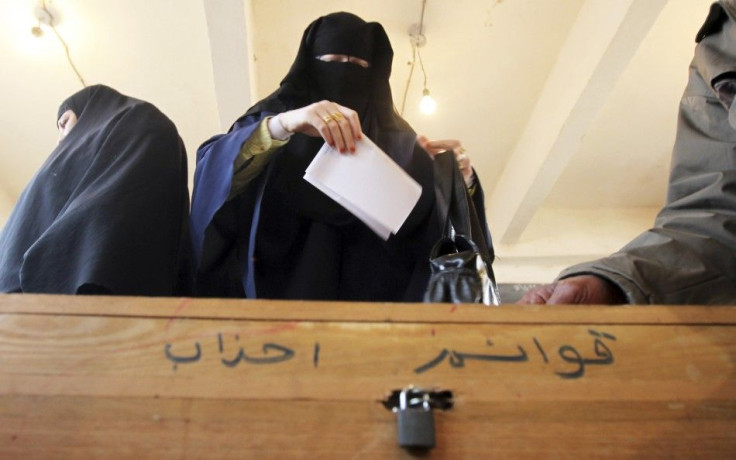Egypt Votes Again; Islamists Make a Push

People in Egypt went to the polls Wednesday to vote in the second of three rounds of parliamentary elections.
There was a large voter turnout in the electoral districts that included Giza, Luxor, Aswan and Ismailia. Like the first round in late November, the vote remained relatively peaceful and orderly, barring a few exceptions.
A polling station in southern Giza was closed temporarily when families supporting different candidates shot at each other. No one was injured, but the shoot-out lasted for 30 minutes, according to Egypt Independent.
There were also some reported instances of voter fraud, but compared to elections under former President Hosni Mubarak, Wednesday's vote was extremely clean. At some polling stations, competing party members tried to talk to voters waiting in lines, a violation of regulations, and at two polling stations Wafd Party members prevented voters from casting their ballots.
In this round of voting, there are 2,271 candidates competing for 60 individual seats, and another 1,116 in the running for the 120 seats that will be given to winning political parties.
Last month's first round of parliamentary elections saw a major victory for the Islamist Freedom and Justice Party (FJP), the political arm of the Muslim Brotherhood. FJP took nearly 40 percent of the seats in the districts that voted.
While Western observers remain wary of the Brotherhood, whose past included extremist tendencies, the now-moderate group seems passionate about democracy and, above all else, is concerned about a free and fair Egyptian society. Despite some conservative rumblings from within the group, sharia law is not a topic of discussion and the Brotherhood has already partnered with a number of secular groups in order to promote cooperation and diversity.
Additionally, the Brotherhood wants to work with Egypt's Coptic Christians, a minority group that has been the target of oppression under the ruling Supreme Council of Armed Forces (SCAF). Indeed, the FJP campaigned to Christian voters and even promoted Christian candidates from within the party.
Whatever the faults of the Muslim Brotherhood (and there are many), they deserve recognition for such pluralist, progressive politics. The first Christian predicted to have been elected came from the FJP, Ed Husain, a Senior Fellow for Middle Eastern Studies at the Council on Foreign Relations and who has described himself as no friend of the Muslim Brotherhood, wrote Wednesday.
But despite the progressive spirit of the Muslim Brotherhood, Salafist parties including al-Nour took 25 percent of the vote last time. The fundamentalist parties have an unabashed non-secular agenda and while it is far too early to predict what might happen in Egypt, some Salafists have proposed a special tax on Christians or a restriction on building permits for new churches.
For some Egyptians, Christians represent a connection to the West, an unfortunate association for the Copts at a time when the country is wary of foreign intervention.
There is a strong sense of xenophobia in Cairo, Husain said in an earlier conference call. There is a dislike of foreign interference in domestic affairs; a lot of that comes from SCAF and the Brotherhood, who have blamed [Egypt's recent problems on] the invisible hand of the West.
The regions voting on Wednesday tend to be more fundamentalist than those that voted last month, and the Salafists could gain more ground.
We have to try Islamic rule to be able to decide if it's good for us, said 60-year-old voter Hussein Khattab told The Associated Press in Giza. If not, we can go back to Tahrir.
The future role of the new parliament is still unknown, and much depends on how much power the military is willing to cede next year. The first task of the new government body will be to appoint members of a constitutional committee, which will write a foundation for the country's new government.
© Copyright IBTimes 2024. All rights reserved.





















